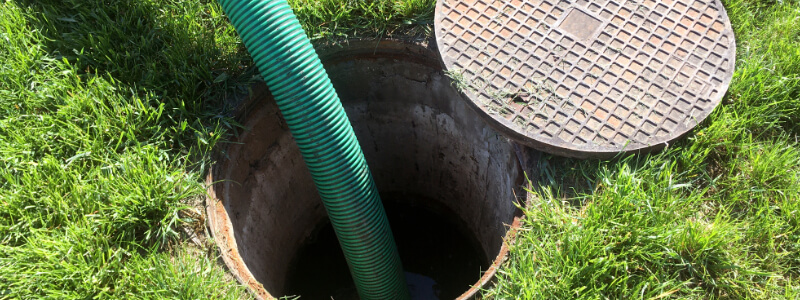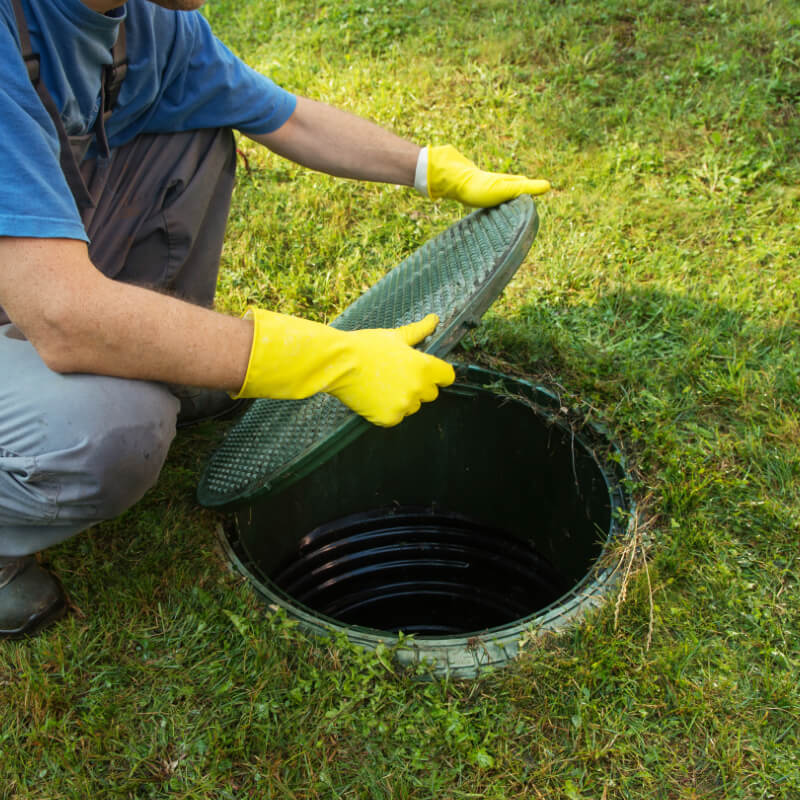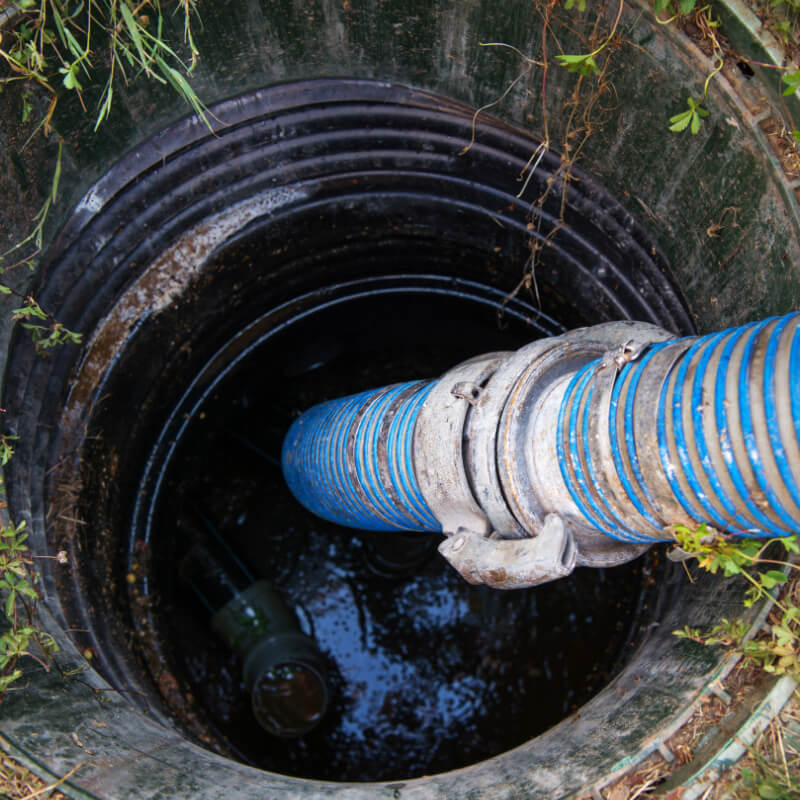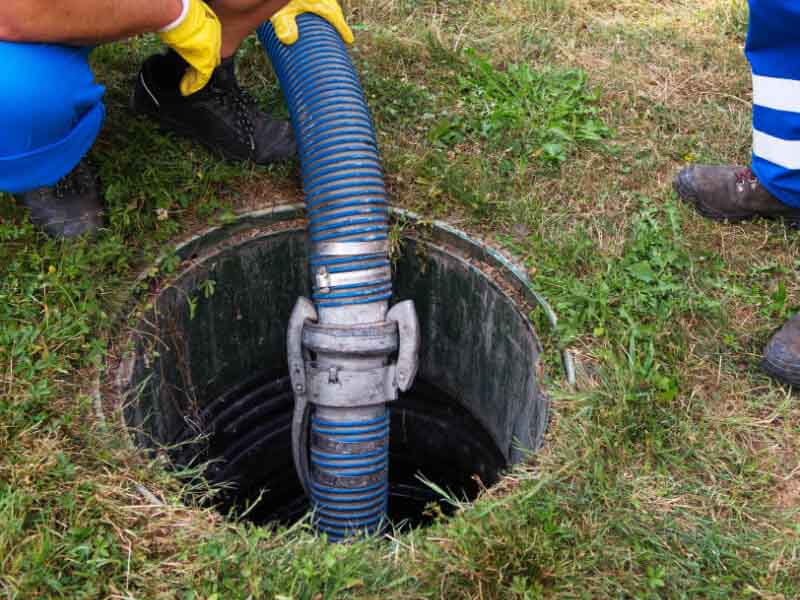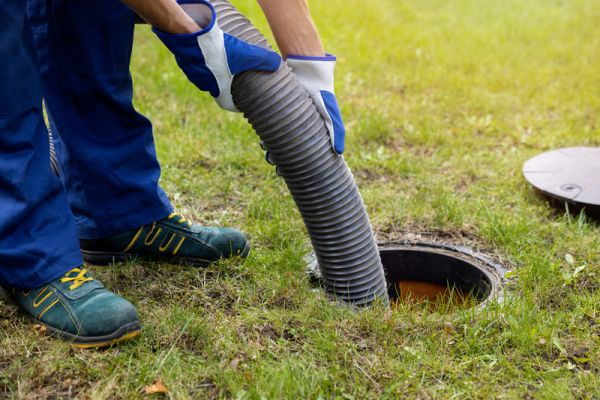In this article
How often to empty a septic tank?
Septic tanks are essential for wastewater management for homes and properties not connected to public sewer systems. These underground sewage treatment plant chambers are designed to collect, treat, and disperse domestic wastewater from bathrooms, kitchens, and laundry activities.
Sewage treatment plants are vital when planning your home's drainage system. Septic systems have proven to be an excellent choice for treating wastewater, but how often do you empty them? In this blog post, we will look at how septic tanks work, how often they need to be cleaned, and how to look after your home's sewage system.

A brief introduction to septic systems
A septic system is a household wastewater treatment method commonly used in areas without centralised/public-served sewer systems. It has several vital components, including a septic tank and a drain field.
Let's look at a brief overview of how what a septic tank consists of:
- Septic Tank: The septic tank is a buried container typically made of concrete, fibreglass, or polyethene. Its primary function is to hold and receive wastewater (via an inlet pipe) from toilets, sinks, and drains. Within the tank, solids settle to the bottom as sludge, while scum, such as grease and oils, float to the top. Bacteria inside the tank partially decompose the solids.
- Drain Field: Once the wastewater is partially treated in the septic tank, the liquid part, (called effluent), goes into the drain field. This field, (also known as a leach field), has pipes in gravel-filled trenches. The effluent moves through the soil, where more processes remove harmful substances.
- Soil Treatment: The soil in the drain field acts as a natural filter, treating the effluent by removing pathogens and other contaminants before they can reach groundwater.
Ongoing maintenance helps prevent system failures, clogging, and unpleasant odours. Emptying septic tanks ensures that accumulated solids do not overwhelm the tank's capacity, preventing potential backups and environmental contamination.
Signs That Your Septic Tank Needs Emptying
When determining if a septic tank needs emptying, there are several common signs to watch out for. These signs serve as indicators that suggest the need for septic tank maintenance:
- Slow Drains: If you notice slow drainage or difficulty flushing in sinks, baths, or toilets throughout your home, it may signal that your septic tank needs attention.
- Foul Odours: Unpleasant odours emanating from your yard or the vicinity of the septic tank could indicate that the tank is reaching its capacity and requires emptying.
- Water Pooling in the Yard: Water accumulating in the yard, particularly around the drain field, can be a sign that the septic tank is full and needs emptying.
Recognising these signs and promptly addressing them through appropriate maintenance, including septic tank emptying, is vital for a septic system's effective and efficient functioning.
Factors such as household size, tank size, water usage, and waste composition are crucial in determining how often a septic tank needs to be emptied. These factors influence the rate at which solid waste accumulates within the tank and the system's overall capacity to process wastewater effectively.
Factors Influencing Emptying Frequency
Household Size:
The number of individuals residing in a home directly impacts the amount of wastewater generated, which, in turn, influences the frequency of septic tank emptying. Larger households typically produce more wastewater, necessitating more frequent maintenance.
Tank Size:
The physical dimensions and storage capacity of the septic tank are significant factors. Smaller tanks fill up more rapidly and, therefore, require more frequent emptying, while larger tanks may have a longer interval between pump-outs.
Water Usage:
The volume of water used in a household affects the amount of wastewater entering the septic system. High water usage can lead to faster tank fill-up, necessitating more frequent emptying.
Waste Composition:
The type and composition of waste that enters the septic system can impact its functioning. For example, the presence of non-biodegradable items or excessive amounts of chemicals can affect the breakdown of waste, potentially leading to a need for more frequent emptying.
Homeowners and property managers must understand these influencing factors to manage their septic systems and ensure optimal performance effectively.
So, how often do you need to empty a septic tank?
The answer to this question is not a simple on and in short: it depends. However, household size can directly influence the frequency at which a septic tank needs to be emptied. Let's take a look at a few examples of household sizes and their corresponding septic tank pumping frequencies:
- Small Household (1-2 people):
- With fewer occupants, a septic tank may require pumping every 3-5 years, as the volume of wastewater and solid waste accumulation is relatively lower.
- Average Household (3-4 people):
- The recommended pumping frequency typically ranges from 2 to 3 years for an average-sized household. This is due to the moderate wastewater production and solid waste buildup.
- Large Household (5+ people):
- A larger household with more occupants may necessitate more frequent septic tank pumping, often every 1 to 2 years, as the higher volume of wastewater and solid waste can lead to quicker tank fill-up.
When determining the pumping frequency, factors such as water usage, solid waste generation, and the size of the septic tank should be considered, as these variables can vary among households.
The benefits of septic sewage tanks
- Cost-Effective: Septic systems can save money in the long term by allowing homeowners to avoid paying for water from public utilities, thus reducing water bills.
- Environmental Friendliness: Properly maintained septic systems can be more environmentally friendly, as they do not contaminate the water supply and remove bacteria before releasing water into the soil.
- Public Health Benefits: Decentralised systems can reduce the risk of disease transmission and human exposure to pathogens, contributing to public health.
- Savings on Water Bills: Homeowners can save money by not having to pay for public sewer services when using a septic system.
Professional Inspection and Maintenance
Professional inspection and maintenance play a critical role in ensuring septic systems' longevity and optimal functioning. Here's why professional involvement is essential:
Assessment of Tank Need:
Professionals are equipped to assess the specific conditions of a septic system, considering factors such as household size, tank size, water usage, and waste composition. Through thorough inspection, they can determine the need for tank emptying based on these influencing factors, providing valuable guidance beyond general guidelines.
Early Issue Detection:
Professionals can identify potential issues early on, such as signs of tank overfill, blockages, or damage. Addressing these concerns promptly can prevent more significant problems and prolong the septic system's life.
Preventive Maintenance:
Regular professional maintenance, including inspections and pump-outs as necessary, is a preventive measure against system failure and costly repairs. This proactive approach can save homeowners from unexpected and avoidable expenses.
Compliance with Regulations:
Many regions have regulations and requirements for septic system maintenance and inspection. Professionals are well-versed in these regulations and can ensure the system complies, avoiding potential legal issues.
Expert Advice:
Professionals provide expert advice on best practices for maintaining the septic system, including recommendations for household habits that can contribute to its longevity and proper functioning.
DIY Maintenance Tips
Here are some DIY maintenance tips for homeowners to maintain their septic systems between professional inspections:
- Use Septic-Safe Products: Opt for septic-safe products, including toilet paper, cleaning agents, and laundry detergents. These products are designed to be less harmful to the septic system and can contribute to its longevity.
- Conserve Water: Implement water conservation practices in the Household, such as fixing leaks, using water-efficient fixtures, and being mindful of excessive water usage. Conserving water reduces the strain on the septic system and helps maintain its effectiveness.
- Mindful Drain Practices: Be aware of what goes down the drain. Avoid disposing of non-biodegradable items, grease, chemicals, and excessive food waste into the drains, as these can lead to clogs and potential damage to the septic system.
It's important to note that while these tips can help with the ongoing maintenance of a septic system, they should complement regular professional inspections and maintenance to ensure the system's optimal performance and longevity.
Environmental Impact and Regulations
The environmental impact of septic systems is a crucial consideration in maintenance and regulation. Failing septic systems can release increased levels of nitrogen and phosphorus into groundwater, contaminating drinking water supplies and posing dangers to the environment - so you will need to register with the environmental protection agency when installing septic tank systems.
Groundwater contaminated by poorly treated household wastewater can harm drinking water and the environment. Septic system failures can lead to the release of untreated wastewater into the environment, containing excessive nutrients (nitrogen and phosphorus) that can impact natural resources.
Local regulations often encompass environmental considerations surrounding septic tank maintenance. Adopting sustainable practices, including regular inspections and adhering to local rules, is crucial in minimising the environmental impact of septic systems.
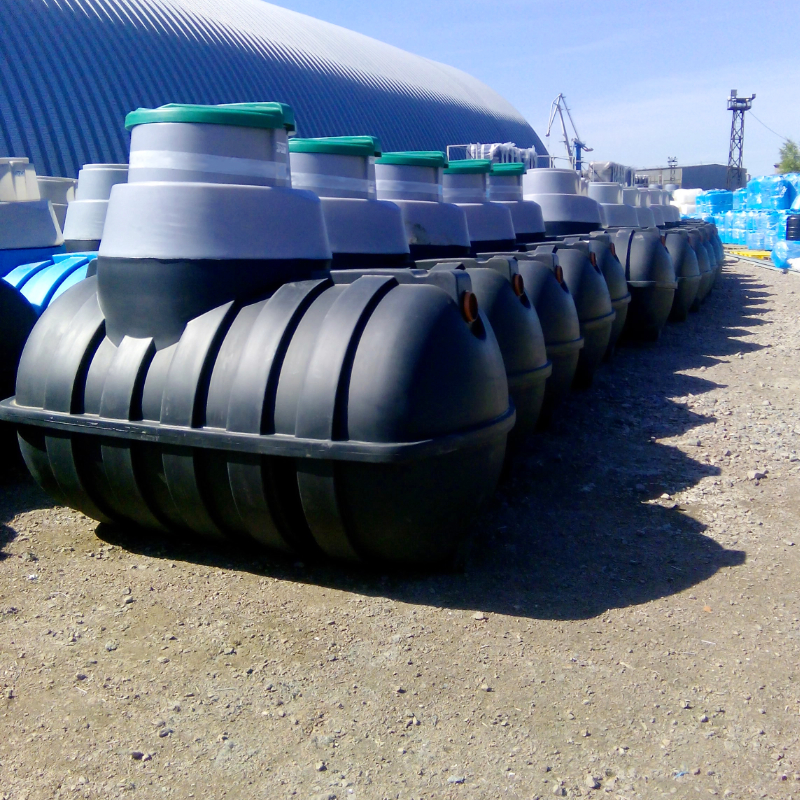
Final Considerations
While the general guideline suggests emptying your septic tank every 3 to 5 years, it's essential to monitor the sludge layer in the tank and consider the specific circumstances of each household. Regular pumping and emptying not only extends the system's lifespan but also ensures its efficient operation. Therefore, you should aim to adhere to a maintenance schedule that aligns with their unique usage patterns and the recommendations provided by local authorities or professionals.
If you would like to learn more about our reliable septic tank solutions and how to maintain your drainage field in your home best, contact us today. Whether you need shallow dig septic tanks or a larger septic tank system, our engineers have you covered.
Get in touch
Contact our friendly and professional team via form, phone or email for any drainage issues you may have.
From blocked drains to septic tank repairs and replacements, we're here to help. We have over 25 years of experience and offer 24/7 emergency callouts.
-
01386 882324
-
WhatsApp
-
This email address is being protected from spambots. You need JavaScript enabled to view it. -
See what our customers think
